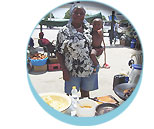 |
Satellite Workshop 2 Globalization and Locality in Southern Africa: A View from Local Communities |
|
| Program and Abstracts >> |
Poster >> |
|
Global currents, including the renewed force of neoliberalism in the post-Cold War era, have strongly influenced economic deregulation and political democratization in Southern African countries since the 1980s. In Southern Africa, South Africa’s political rebirth, with the abolition of apartheid in 1991, realization of a democratic government in 1994, and repeal of economic sanctions by other countries, has greatly affected neighboring countries. Lacking a competitive edge in the world market, South Africa has expanded its export markets and capital investments in neighboring countries. The result has been a rapid influx of South African goods and capital into these countries, enhanced by greater human exchange across the South African border, notably izn the form of labor migration and cross-border trade that have directly connected rural Southern Africa to the urban centers of South Africa. Globalization in these Southern African countries may be characterized by this multilevel feature, in which South Africa acts as a booster, partially transforming global currents in amplitude and direction, a phenomenon we might call “Globalization ver. Southern Africa.”
This situation can be seen, in turn, as a process in the production of an integrated “Southern African locality” within a multilevel movement. The rush of goods and capital from South Africa has brought various outcomes in surrounding countries, including the exclusion of local products from the market, a selective increase in employment, a greater disparity with regard to access to natural resources, and the destruction of the environment. Local communities in Southern African countries have experienced considerable transformation with regard to subsistence, land tenure, resource utilization, and social relationships. These transformations are not simply products of the economic dominance of South Africa. They are also products of peoples’ agencies , as people work to improve local daily life. “Globalization ver. Southern Africa” is thus a ramifying and multilevel process, producing myriad localities in the production of an integrated “Southern African locality.”
The purpose of this Satellite Workshop is to discuss the actual condition of “the Southern African version of globalization and the production of Southern African locality/localities”. We will examine the transformations of local communities, based on concrete observations in rural and urban field settings, with focuses on subsistence activities, resource use, land tenure, and associations.
| >>Satellite Workshop 2: Program and Abstracts | ||
| 13:00-13:05 | Introduction |
|
| 13:05-13:35 | Two Perspectives on Globalization: The National Beef Industry and Local Livestock Farming in Namibia FUJIOKA Yuichiro (ASAFAS, Kyoto University) |
|
| 13:35-14:05 | The Exchange of Indigenous Goods in Contemporary Southern Africa MIYAUCHI Yohei (Rhodes University) |
|
| 14:05-14:35 | The Impact of Angolan Immigrants on Lozi Society in Western Zambia OKAMOTO Masahiro (ASAFAS, Kyoto University) |
|
| 14:35-15:10 | The ‘South Africanisation’ of Southern Central Africa: Global Meets Local in theUpper Zambezi Valley Lawrence S. Flint (ENDA Tiers Monde, Dakar) |
|
| 15:10-15:20 | Coffee Break | |
| 15:20-15:50 | Expansion of the Global HIV/AIDS Epidemic in Zimbabwe IIDA Masashi (ASAFAS, Kyoto University) |
|
| 15:50-16:25 | International Reterritorialisation and Changing Forms of Governance: Migration, Economic Alterations and Shifting Authority in Contemporary Southern Africa Scarlett Cornelissen (University of Stellenbosch) |
|
| 16:25-16:35 | Coffee Break | |
| 16:35-17:30 | Discussion |
|